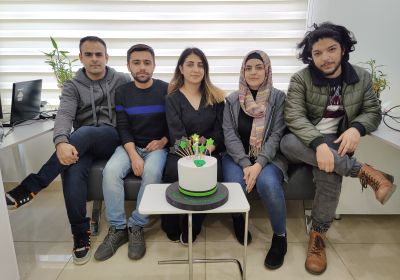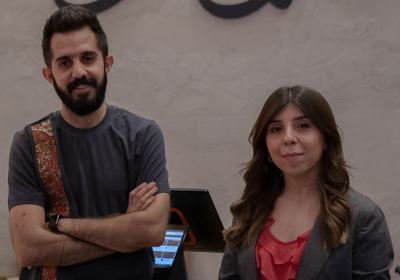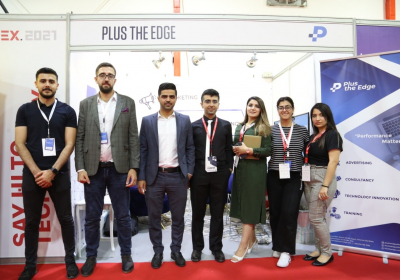AUIS Alumni Spotlight: Tara Mohammed, Founder of Black Ace Company
Tara Mohammed, an AUIS graduate (Information Technology ‘18), is the founder of Black Ace company for IT solutions. Black Ace has a diverse and young team from different backgrounds, and Tara credits her team with having had a great impact on her and being by her side from day one of starting her business. More than just serving budding entrepreneurs, Tara has focused on hiring and targeting fresh graduates to help them gain experience, build their skills, and prove themselves as professionals and entrepreneurs.
AEIC: Tell us more about your business.
Tara Mohammed: Black Ace works in IT solutions and our main services include software solutions and cloud services. We have other services such as hardware and infrastructure services, professional and technical training, as well as IT consultancy and support. We focus on bringing the newest technology into the market and we believe in providing top quality service to our customers. Black Ace's strength is to always bring the best and newest technology to the market.
AEIC: What inspired you to start your business?
TM: I had this idea since January 2019 and after six months of planning, we launched officially in July 2019. Seeing a gap in the market helped me pave the way for this idea. We do have many experienced and great companies but they are outdated and don’t reach today’s market needs in this area.
Technology is evolving very fast and to keep up with the industry is not easy, so as a technology company it is our goal to always bring the newest technology standards and keep up with the changes to give the market what it needs.
We faced issues defining the problem, which was related to quality and changes in market needs. So we took that and designed a product to fit customers’ needs rather than creating a fixed solution focusing on our own income. Business is much more than a paycheck. I do this because I love what I do -- IT and development -- and I recommend everyone do what they like so they can achieve outstanding work.
AEIC: How did you come up with the name of Black Ace?
TM: We wanted something unique and meaningful. ‘Ace’ means ‘a person who excels at a particular activity"’, and “black” came with it and we liked it so we decided that was it.
AEIC: What were your challenges?
TM: Human resources was one of the challenges we faced at Black Ace. It took us time to build a team, but I am very happy and proud of each and every one of our employees. Another challenge was COVID-19, but Black Ace survived through that and it made us stronger.
AEIC: How did your AUIS education help you succeed?
TM: I had so much energy and I wanted to direct that energy into my vision. For this I have to credit AUIS and the course options I had. I had an opportunity to learn and I took every bit of it and invested it in myself through learning and making the best out of every class. For example, taking a class in accounting may seem irrelevant but in my position now I have to understand numbers and deal with them. Finance, marketing, small business management, project management, and contentive business analysis were some of the best classes and I wish more students would consider taking them. When you are the CEO, it doesn’t mean that you have to do everything, but you have to understand everything in your business.
The flexibility that AUIS offered helped me to manage studying and work at the same time was very valuable since my working experience in different environments led me to build a unique one within Black Ace.
AUIS gives everyone an opportunity and if you take that opportunity well it will help you become a very prosperous and a promising individual. Being in a liberal arts university doesn’t only teach you raw material but also how to think critically, manage your time and develop your soft skills.
AEIC: How has your past experience helped you today?
TM: I have been working for over seven years now in multiple diverse environments, and I see these experiences as a ladder to help you reach your destination. It is important to communicate with others to understand the market. Work experience with others will also help you evolve and understand workplace environments more. Building your network, gaining experience and understanding market needs all help you with adding value and implementing your own vision.
AUIS helped me start early since I had the option to choose my classes and schedule them according to my work. Now I can see the reflection of the work experience I’ve had on my business.
AEIC: What do you do to make sure your business runs at its peak?
TM: We are a customer-centered business, meaning we always put the customer’s values and needs above all and we make sure everything is perfectly set.
It’s also important to work hard and be passionate about what you do, as I have always been about business. If you love what you do, you can manage well and continue. We feel very responsible for every project and all work that is being done in our company. We consider every client to be a VIP, regardless of their income. Every employee in Blackace loves what we do.
AEIC: What advice do you give to other business owners and startups?
TM: For business owners, it is important to have a strategic plan, but you will also figure things out on your journey. You may face problems you didn’t consider, so it is important to learn and adapt, as business is about adaptation. I believe that as a manager/leader you need to lead by example, and your personal values will definitely reflect on the business.
For startups, you can never wait for the right moment to start; you have to create the right moment for establishing your idea. Looking at the current circumstances of our region, many might say it is not suitable to start a business, but it is very important to know which voices to let in since words have power that can either build you up or break you down. You feed on the energy of others. If you keep going around the wrong people, you will get their negative vibes and energy. Surround yourself with good people to keep yourself focused on your target and to keep up the energy in you moving forward.
AEIC: What are your regrets and lessons learned?
TM: I don’t have any regrets because I always try to make the best out of any situation and I own up to every decision and count myself responsible for my actions. Every day is an opportunity to learn more, especially as an entrepreneur. Overall, the one lesson I want to share is for everyone not to take things personally; try to rationalize and find the best route to deal with it.
AEIC: What is the most difficult part of your business as a founder/owner?
TM: It is not easy to start your own business. Sometimes it may feel like everything is against you, but what keeps you from failing is that one extra attempt or try, and having the spirit to keep going. To be realistic is not always easy as sometimes the tide might go against you, but always keeping an optimistic vibe is important to help you go forward.




